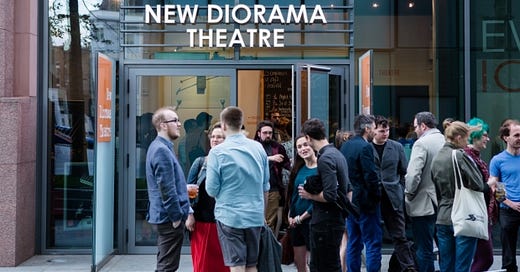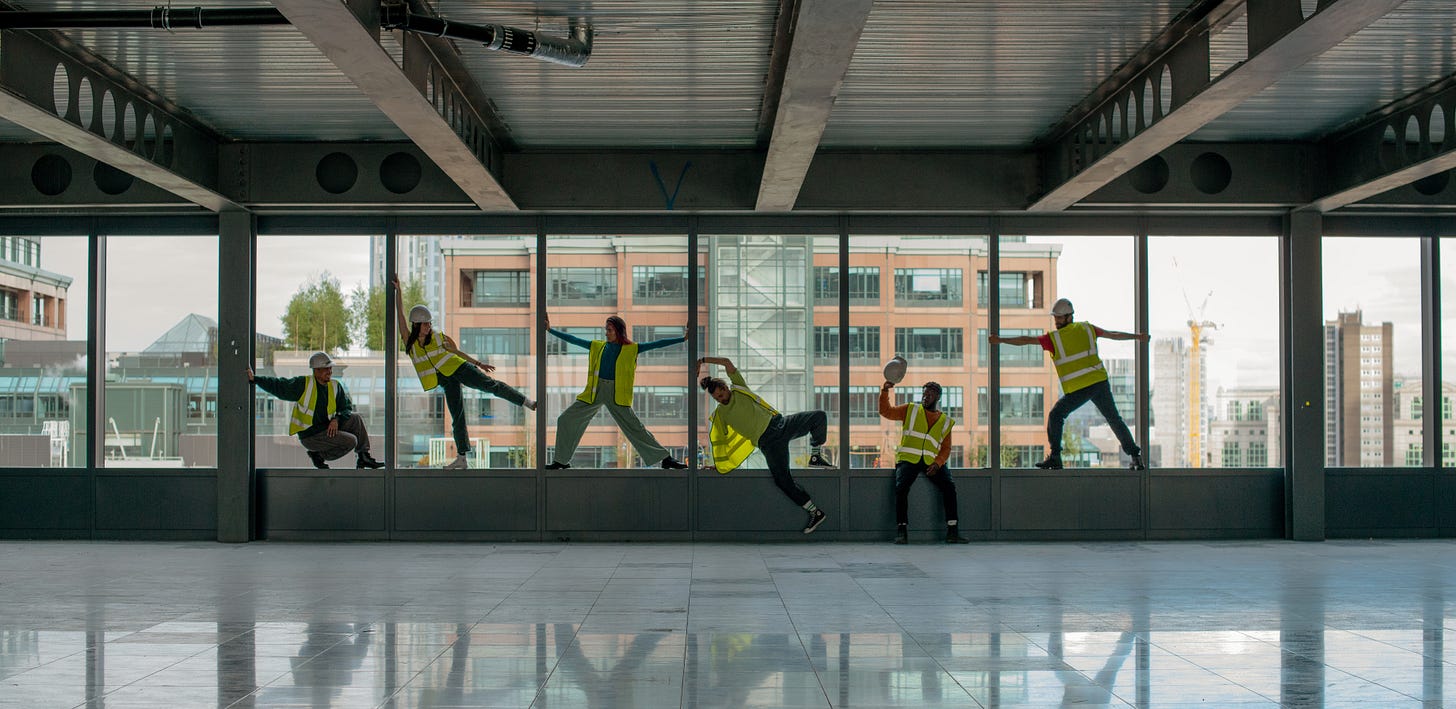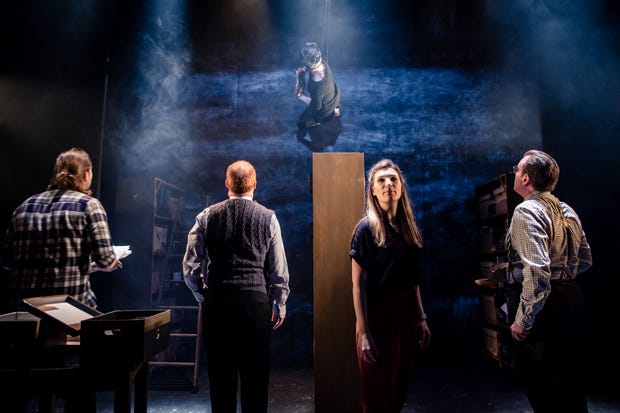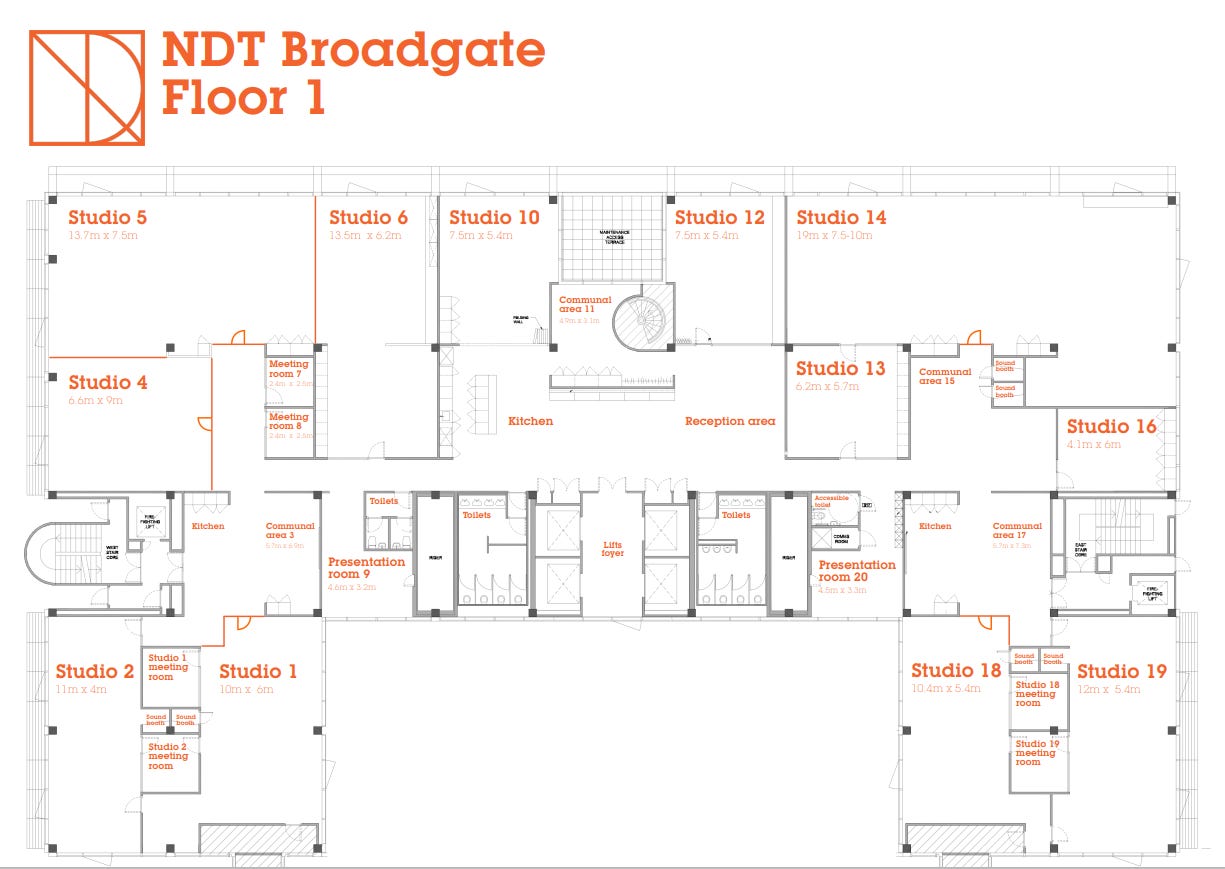David Byrne - artistic and executive director, New Diorama Theatre
On NDT Broadgate, the "riskiest thing" his organisation has ever done.
Hello…
How’s it going? I hope the return of live theatre has brightened up the rainy days. What have you been to see? What have you booked a ticket for? I haven’t been back to a theatre yet myself - they are still closed in Scotland, because strict government guidelines on social distancing are making it inviable - but I’m heading south for a few weeks soon, and planning on catching as many shows as possible when I do. Let me know what I should be seeing!
And welcome to the eleventh issue of The Crush Bar, my fortnightly newsletter about theatre and the people that make it. If you haven’t subscribed already, then please do so…
This is probably the issue I’ve been looking forward to most. It features an interview with the one and only David Byrne of the New Diorama Theatre - probably my favourite theatre organisation anywhere - and it is mostly about the extraordinary new facility he has announced today. Read on to find out more about it, and about how it is going to kickstart fringe theatre post-pandemic.
It will become obvious over the next 2000 words or so that I think David is the bee’s knees. It has become a bit of a running joke that any exciting new company I come across, he has discovered first and is already supporting somehow. We chatted over the phone for a couple of hours last Friday - and it was brill to find out how he manages to achieve so much with so little. He is, in my humble opinion, a huge asset to the whole theatre industry.
Right, gush over. On with the interview. See you at the bottom.
Interview: David Byrne
Artistic and executive director David Byrne, much like his musical namesake, is a pioneer.
In 2011, he founded a completely new type of theatre – a “companies theatre” – in the middle of a shiny, corporate office complex just off Euston Road. In 2016, that theatre launched its artist development programme – a wide-ranging raft of initiatives that has subsequently nurtured dozens of companies and hundreds of creatives. In 2017, Byrne’s theatre partnered with Underbelly to launch the influential Untapped Award at the Edinburgh Fringe. In 2018, it overhauled its programming model, putting unprecedented confidence in emerging ensembles.
And now, as the performing arts industry tiptoes out of the worst crisis in its history, Byrne’s theatre – London’s mini but mighty New Diorama, if you have not realised yet – is about to embark on a bold enterprise to breathe new life into the fringe. It is, according to Byrne, “the riskiest thing we have ever done.”
“Independent freelancers have had an incredibly challenging time over the last twelve months, and I think a real distance has grown between organisations and that freelance community,” he says. “As an organisation, we wanted to do something that is really going to make a difference. Something that is really going to show the level of generosity and ambition that will help bridge that gap.”
“I’m terrified, but all that fear is laced with a huge amount of excitement and energy to get out there and start rebuilding…”
So, what exactly is the New Diorama doing this summer? Well, it is reopening in July with a new season, including the first immersive experience it has ever staged. It is taking over the running of its revamped café and bar, too. It is also preparing for its delayed tenth anniversary season this Autumn.
And – this is the big bit – it is launching NDT Broadgate, a new, 20,000 square-foot complex in the heart of the City of London, which will offer fully-staffed, fully-equipped rehearsal spaces and meeting rooms to over 80,000 creatives over the course of a year – and offer them entirely for free.
“It actually feels more like starting an organisation from scratch than reopening,” Byrne says. "It feels like we are at the foot of a mountain we are about to climb. I’m terrified, but all that fear is laced with a huge amount of excitement and energy to get out there and start rebuilding, and start finding new ways of doing things.”
Byrne was born in Stevenage in 1983. He studied drama at the University of Hull, but after graduating in 2005 with no industry contacts and no clue of how to start a career in theatre, he seriously struggled to find work. Eventually, after writing hundreds of letters to theatres up and down the country, he got a job – a position at the Rosehill Theatre in Whitehaven, Cumbria.
Byrne essentially ran the Rosehill Theatre for a year by himself, learned a lot, then returned south. Several shows with several companies followed – Byrne was mainly a writer, occasionally a director, but always enjoyed working collaboratively – before he found a job as programming manager at a newly-built 80-seat performance space just off Euston Road in 2010 – the New Diorama.
At first, the New Diorama was run by children’s company Quicksilver, but the situation quickly changed – Quicksilver lost its funding, and the two organisations separated – and Byrne was left as artistic and executive director of a brand-new theatre and carte blanche to do what he wanted with it. Together with executive producer Sophie Wallis, he decided to dedicate the space to ensemble-led work, and over the last decade, that is exactly what he has done, winning three Peter Brook Awards and two The Stage Awards in the process.
“All my time and energy is now focused on making sure everyone in the New Diorama’s wider orbit survives…”
A list of artists that have been involved with the New Diorama through its myriad support schemes since then reads like a who’s who of contemporary British theatre companies: Breach, Kandinsky, Antler, Barrel Organ, Silent Uproar, Poltergeist, Burnt Lemon, Ugly Bucket, The PappyShow, Rhum and Clay, Deafinitely, and many, many more. (Of the people I have interviewed for this newsletter, I know for sure that four have been involved at the New Diorama, and I suspect several more have, too.)
And, alongside shepherding these groups from emerging artists to established companies, Byrne and the New Diorama have also managed to make some of their own in-house productions. 2017’s Secret Life of Humans was an intelligently layered adaptation of Noah Yuval Harari’s best-selling book Sapiens, written and directed by Byrne. 2019’s The Incident Room was a headlong thriller about the mistake-strewn hunt for the Yorkshire Ripper, co-created by Byrne again.
“This job has probably become too big for me now,” Byrne says, when asked about how much his role has changed over the last decade, and how soon he will be making work again himself. “I won’t be writing or directing myself for a while. I sort of lost my creativity during lockdown, and all my time and energy is now focused on making sure everyone in the New Diorama’s wider orbit survives.”
At the heart of everything the New Diorama does is one key relationship – its partnership with British Land, a property development and investment company with a portfolio of office and retail space valued at over £11 billion. It is, remarks Byrne, probably the only relationship of its kind in the country.
The firm is the theatre’s principal supporter – the theatre is not a National Portfolio Organisation – and the reason for the venue’s very existence: the performance space was included in British Land’s redevelopment of Regent’s Square in the 2000s under a Section 106 agreement – a legal contract between private developer and planning authority stipulating community-focused obligations on the part of the former.
“Section 106 agreements have a very bad track record,” says Byrne. “Look at the Shaw Theatre in King’s Cross, or LOST Theatre in Vauxhall. The difference with us is that our relationship with British Land has grown over time. They are a FTSE 100 company and we are a small arts organisation, but we have found things to work on together, and that collaboration has unlocked some of the really cool things we have done.”
“I think sometimes in the arts we can be a little bit afraid of working with big business organisations,” he continues. “I understand that reticence, but I don’t necessarily agree. Obviously, there are lots of companies we wouldn’t partner with – I’m not saying all big business is great, of course not – but our relationship with British Land has been nothing but good. It has lasted ten years. There is a mutual trust there, and shared values. They were the first people on the phone when we had to close last year.”
“They are a FTSE 100 company and we are a small arts organisation, but we have found things to work on together…”
It is because of British Land that the New Diorama is able to open its revolutionary new facility in Broadgate – the project is a partnership between both organisations and the City of London’s new Culture and Commerce Taskforce, and is supported by Arts Council England and Jerwood Arts, among others. It is an echo of an earlier initiative the two companies collaborated on – the ND2 facility Byrne ran throughout 2017, which was the biggest rehearsal space in London at the time – but there is a big difference this time around. NDT Broadgate will be free to use.
Yep. 20,000 square-feet over two floors. 16 rehearsal studios, 10 meeting rooms, a design studio, a “make space”, communal areas and kitchens. All designed by theatremakers Joshua Gadsby and Naomi Kuyck-Cohen. All for the exclusive use of theatre-makers, with over half of the spacereserved for Black, East Asian, South Asian led work, D/deaf and disabled led work, and artists from low socio-economic backgrounds. And all entirely free for a year. That, apparently, is 108,924 hours for creatives to create - and to create whatever they want to.
“We keep talking about NDT Broadgate as an engine,” says Byrne. “It is going to be a space where people can come together, after a year of being on their own, and start building towards the future we have all been talking about online. And we aren’t going to tell anyone how to do that. We are just going to give them the space and the support and the resources and let them get on with it.”
Significantly, continues Byrne, the New Diorama will not be the only organisation using NDT Broadgate. It is overseeing the entire project, but four associate companies – Nouveau Riche, The PappyShow, Migrants In Theatre and Chinese Arts Now – will also have space there, and complete autonomy over what they do with it and who they invite to use it. There will not, Byrne explains, be “a single gatekeeper holding the key”. There will be “multiple, diverse ways in”.
It is typical of Byrne to empower artists like that – it is what he has been doing for a decade – and it is typical of Byrne to pitch NDT Broadgate not as an extraordinary one-off initiative but as a conversation-starter, as an invitation for other organisations to get involved and to emulate.
“We sort of want people to steal our idea and run it elsewhere…”
“I don’t want NDT Broadgate to be presented as a completely sealed box run by one company because that feels like the old way of doing things,” he says. “I want it to be a shared project with shared ownership. I want our partners to do their own thing. I want people to do things with the space that we haven’t even imagined yet.”
“We also want NDT Broadgate to be a bit of a blueprint,” he adds. “It was just empty office space before, and just think of all the empty office space there will be across the country after the pandemic. Artists and theatres increasingly live on the borders of our towns and cities. This feels like an obvious partnership to put them back in the heart of them.”
“As an organisation, we have leveraged our relationships to make that happen, and others could do the same,” he says. “We sort of want people to steal our idea and run it elsewhere.”
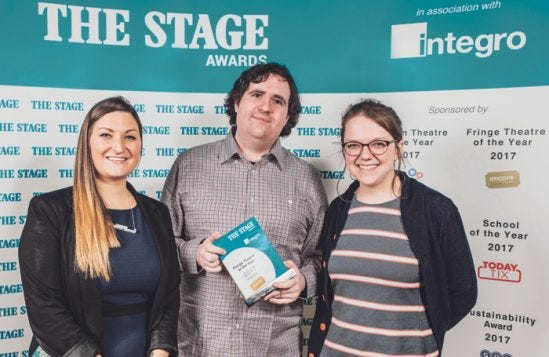
You might expect someone as busy as Byrne, who has achieved as much as Byrne has over the last decade, to be a big, bold personality – a go-getter with bags of energy who does not suffer fools gladly – but he is not. He is a bit shy (that’s why there is only one photo of him in this article, and it’s right at the bottom), hugely insightful, and particularly passionate when it comes to talking about what can be done to improve the theatre industry. He is also frank about the fact that he has seriously struggled with his mental health at times.
“I have been at a very low ebb on several occasions over the last year,” Byrne says. “There have been times when I have found it hard to get out of bed. I always worry that people see me presenting plans like this and think that I’m some kind of all-singing, all-dancing whatever. That they think I’m fine when really I’m not fine at all. I find things really, really hard sometimes.”
He does manage to get out of bed, though – and then some. It is no exaggeration to say that the landscape of fringe theatre in the UK looks profoundly different because of Byrne. The initiatives he has spearheaded from his 80-seat theatre off Euston Road have made – and will continue to make – a lasting impact on the way the performing arts industry works. And NDT Broadgate, he says, is the most significant thing his theatre has done yet.
“We have come a long way as an organisation in the last ten years,” says Byrne. “And I have come a long way personally, too. I am increasingly feeling like it might be time to hand over the baton and go and do something else. It does feel, though, that all the stuff we have done has been leading up to this, though. It feels like a big moment. We just have to make sure we don’t fuck it up.”
For more information on NDT Broadgate, email broadgate@newdiorama.com or visit www.newdiorama.com.
Bits and bobs, shouts and murmurs…
If you want to read a bit more from me, then I interviewed Ellie Keel, Atri Banerjee, Nadia Fall, Fehinti Balogun and others for this long-read about reopening in The Stage.
And I am currently writing a series of blogs for Stage Directors UK in support of their research on “resilience” post-pandemic. You can read them here.
Also - now everything is focused on live theatre again - I wrote a thing for Exeunt on the future of digital theatre, and how I hope the massive progress made over the last year will not be lost.
I couldn’t agree more with this article from Lyn Gardner on producers - and how the vast majority of them aren’t exploitative arseholes, but lovely people often doing extraordinary things in impossible circumstances. A few of them are exploitative arseholes, though.
The third Thomas Cromwell novel is going to be adapted for the stage (and, fingers crossed, for TV afterwards, like the first two were). And Alex Wood has interviewed Hilary Mantel and star (and now co-writer) Ben Miles here on WhatsOnStage.
And finally, I would just like to say what an absolute pleasure it is to read reviews of live theatre again. Like Andrzej Lukowsk on Harm at the Bush Theatre. And Paul Vale on Cruise in the West End. And Clare Brennan’s of The Greatest Play in the History of the World. And loads more.
Until next time…
Wow. How about that? I hope you enjoyed finding out about NDT Broadgate as much as I did. It sounds amazing - and I cannot wait to see all the incredible, inspiring things that come out of it. I will be very interested, too, to see if anyone attempts to emulate the idea elsewhere - because that would be awesome.
The next issue of The Crush Bar will be along next week - hopefully back in its usual Friday slot, but we will see. I am going off to the Isle of Rum this weekend - weather/midges permitting - so I might not have time to pull it together until the following week. Let’s just see how it goes.
Meanwhile, if you want to get in touch for any reason, you can just reply to this email, or contact me on Twitter - I’m @FergusMorgan. Right. That’s me. See ya.
Fergus x
P.s. The dog is fine, by the way.

